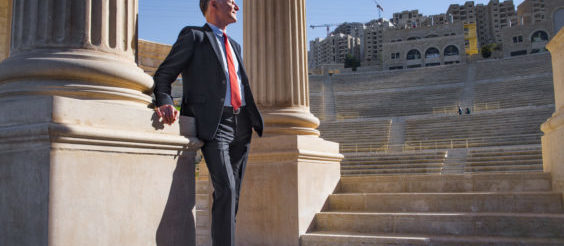Palestinian Planned City Founder Aims to Face Settlements with Innovation – The Media Line

Aal-Ard initiative hopes to help Palestinians stay on their lands, fight emigration
Businessman Bashar Masri, the founder of Rawabi, the first planned city built by and for Palestinians in the West Bank, launched the Aal-Ard initiative on Tuesday, to fund creative ideas that encourage Palestinians to consolidate their “historical relationship with the land,” and to highlight the dangers of settlement growth in the West Bank and its effect on the lives of Palestinians.
The Aal-Ard (“Land”) project, which aims to enhance Palestinians’ “resilience and steadfastness” to remain on their land in the face of the “continuing and escalating expansion of Israeli settlements,” was launched at a press conference in Ramallah.
Masri said during the press conference that the initiative was open to any innovator and pioneer, local or foreign, who addressed the issue of Palestinian land rights and showcased the Palestinian narrative in the face of settlements, which targeted Palestinian human rights, history, wealth and natural resources.
“This pure Palestinian initiative is here to show the world our just cause and the dangers created by [Israeli] settlement to Palestinians and to the peace process,” Masri told The Media Line. He explained that the project was thus far financed by him but was open to donations from anyone who supported it.
“I hope this initiative will inspire others to contribute and support the hundreds of ideas that we are going to receive. The budget of Aal-Ard initiative is open, as we expect people − Palestinians and non-Palestinians − to donate millions of dollars to support the Palestinian people through a ground-based initiative that is actionable; not only words but a realistic initiative,” Masri added.
He pointed out that more than 70% of Palestinians were under the age of 30. This category was particularly under threat, he said. “When they emigrate, they never return back home, and we need them. We are building a state and we need Palestinian talents to stay here. The biggest threat to the Palestinians today is settlements, so our goal is to support the steadfastness of the Palestinian people in their lands.”
Masri told The Media Line that the initiative would focus on settlements but would create jobs for Palestinians in the process. “I hope this initiative will inspire others to come up with other initiatives to support Palestinian youth.”
Aal-Ard proposals are submitted to a Referees Committee. Ideas chosen by the committee will receive logistical, technical and professional support, and financial support ranging between $300 and $140,000 (1,000 to 500,000 shekels). Each applicant team must have at least three members, whether they be individuals, institutions or companies, and the idea must be implementable with a specified team and a specific timetable and budget.
The Media Line asked Referees Committee member Prof. Dalal Iriqat, vice president for international relations at the Arab American University in Palestine, whether the initiative included Area C of the West Bank, which is under full Israeli administrative and security control according to the 1995 Oslo II Accord. Iriqat said Aal-Ard targeted all Palestinian land within the pre-1967 borders, as guaranteed by international law to the Palestinian people.
“I support dropping the term ‘Area C.’ First and foremost, [areas] A, B and C are Palestinian land. As Palestinians we must stop using these terms, as by doing so we make them a reality on the ground,” she said.
Iriqat affirmed that any implementable idea on the Palestinian land or elsewhere, which could limit or stop settlement expansion in the West Bank, had an opportunity through this initiative: “As long as it serves Palestine and the stand of the Palestinians, as long as it addresses the settlements, we will accept it.”
She added that the initiative was extremely important for Palestinian youth. “I’m a big believer that our reality in terms of politics, society and economics won’t be changed except by our young generation through entrepreneurial, creative and innovative ideas.”
Palestinian Authority Minister Walid Assaf, head of the PA’s Colonization and Wall Resistance Commission, told The Media Line that his committee was not part of Masri’s initiative, as it had its own PA-funded projects, but “we support everything that serves the Palestinian people and its resilience, and we don’t object to any project that aims to help our citizens in Area C.
“I will judge the initiative by how much it helps Palestinian citizens in facing [Israeli] settlements,” he said.
Some Palestinians expressed uncertainty about Masri’s initiative because in building the city of Rawabi, located 6 miles northwest of Ramallah and 12 miles north of Jerusalem, he works with Israeli (but not settlement) companies and the Israeli government. He still needs Israel’s approval for the main road to the city and the location of the water pipeline, because they are located in Area C.
Most of Rawabi is located in Area A, under full Palestinian Authority control.
Masri has called Rawabi a “Marshall Plan for Palestine’s economy,” as it has created hundreds of jobs.
